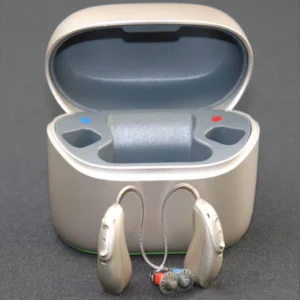From First Fit to Last: Navigating How Long Do Hearing Aids Last
Hearing aids are pivotal in enhancing daily communication and significantly improving quality of life. They might even help you live longer. Knowing how durable hearing devices are is essential if you’re investing in them.
On average, quality hearing devices last three to seven years. However, various factors can influence their longevity, which we will explore in this post. We’ll also provide essential tips for maintaining your devices and discuss when it might be time for an upgrade.
Key Influences on Hearing Aid Longevity
Several factors determine the longevity of your device:
Care Essentials
Proper maintenance is crucial:
- Routine Cleaning: Clean per your audiologist’s recommendations to avoid earwax and debris buildup.
- Correct Storage: Store your devices in a dry, temperate environment to avoid damage from heat or moisture.
- Battery Management: Use and handle the correct batteries properly to avoid damage and leakage.
Usage Impact
How and where you use your hearing aids affects their durability:
- Regular Usage: Using your hearing devices consistently helps maintain their function but also causes wear.
- Environmental Factors: Protect your devices from dirt and moisture. Consider additional protective measures for active lifestyles.
- Careful Handling: Minimize drops and impacts, which can damage sensitive internal parts.
Technological Effects
Advancements in technology also play a role:
- Modern Features: Features such as wireless connectivity might reduce durability due to added complexity.
- Enhanced Battery Life: Newer models often have longer-lasting batteries, which can reduce the frequency of replacements.
- Improved Materials: Recent developments in materials and design enhance the robustness of hearing aids.
Being aware of these aspects can help you care better for your hearing devices and potentially extend their usable life.
Discover more about the parts of a hearing aid.
Tips for Maximizing Hearing Aid Performance
To ensure your hearing aids last as long as possible, consider these guidelines:
- Adhere to Cleaning Protocols: Follow the specific cleaning instructions provided by your audiologist.
- Control Moisture: Keep your devices dry; use a dehumidifier if you live in a humid area.
- Handle with Care: Always store your hearing aids in a sturdy case when not in use.
- Regular Audits: Have your hearing aids professionally cleaned and checked regularly.
Adopting these habits will help maintain your hearing aids in top condition for years.

Signs You Might Need New Hearing Aids
Even with meticulous care, your hearing devices might eventually show signs that they need replacing. Here’s how you can tell when it’s time to consider an upgrade:
Decline in Audio Quality:
- Distortion or Muffled Sound: If your hearing devices no longer produce clear sound and everything sounds muffled or distorted, the internal components may be worn out.
- Increasing Volume: Regularly turning up the volume higher than usual could indicate that your hearing aids are no longer providing adequate amplification.
- Persistent Feedback: If you experience ongoing whistling or feedback sounds, this could mean that the fit is no longer proper or internal components are failing.
Battery and Performance Issues
- Frequent Battery Replacement: If you find yourself changing batteries more often than before, this could mean the hearing aids are losing efficiency.
- Connectivity Problems: For hearing devices with wireless capabilities, consistent issues with connecting to other devices can be frustrating and might warrant an upgrade.
- Physical Wear and Tear: Visible signs of wear, such as cracks or broken pieces, can affect functionality and are a clear sign you might need new devices.
Lifestyle and Hearing Changes
- Increased Hearing Loss: If your hearing has deteriorated further, your current hearing aids may not be sufficient. An audiologist can assess whether a more powerful device is needed.
- New Activities or Environments: If you’ve started a new job, hobby, or have moved to a different environment that has different acoustic demands, you may require hearing aids with specific features like better noise reduction, wind resistance, or waterproof capabilities.
- Health Changes: Conditions like arthritis can make handling small hearing aids difficult, and switching to models with easier controls or rechargeable options might be beneficial.
Recognizing these signs early can help you maintain optimal hearing support by transitioning to new hearing aids that better match your current needs.
Find out more about good hearing aids for seniors.

Final Thoughts: Ensuring Your Hearing Aids Last
While hearing aids generally last between three to seven years, proper care and timely maintenance can extend their lifespan. If you start to experience problems with your hearing aids, or if there have been significant changes in your hearing needs, it might be time to visit Stanford Hearing. Our specialists help you assess your current devices and explore options that suit your lifestyle. Reach out to us today for expert advice, and continue to enjoy clear communication every day.
